After spending months at home during a crisis, workers have never been more in touch with what they want from their work and workplace. They have new and increased expectations of their employers and workplaces — desiring a dramatically different and better experience than the one they left.
A synthesis of multiple Steelcase studies identified five critical employee needs that will change the overall work experience. Many of these were emerging before the pandemic, but the time spent working from home accelerated the awareness and importance of each.
Explore Five Things Employees Need Now:
Safety
Belonging
Productivity
Comfort
Control
Safety
For people to feel comfortable returning to the office, they need to both be safe and feel safe. They are pandemic-aware, and people in every country rate a new set of safety issues as their top concerns about returning to the office, with a strong emphasis on mitigating the spread of disease.
“I am trying to choose my days to be in the office. Certain days have more people present, and I am finding that they don’t always follow the rules. There gets to be a closeness that makes me feel uneasy… the more people, the more risk.”
— Study Participant
Air quality, the adherence to safety protocols and general cleanliness rank among the most important safety considerations. It’s clear people will need to feel confident that their workplaces are safe and to trust their employers and peers are doing everything possible to keep them safe before returning.
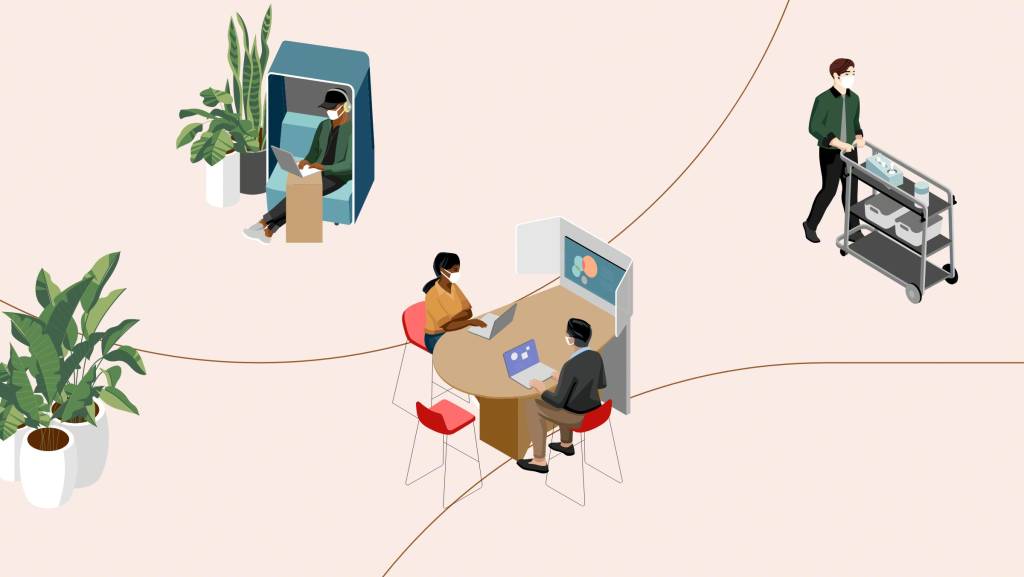
New Health and Safety Priorities
People were asked what would make them comfortable returning to the workplace. They were given eight factors and asked to rate each based on how important it was for their return.
Air Quality, Adherence to Safety Protocols and Facility Cleanliness rank among the most important safety considerations in almost every country (see top three for every country, use arrows below):
Belonging
People have a basic need to belong — it’s fundamentally hardwired in our DNA and something people were searching for pre-pandemic. At the same time, the coronavirus has left people feeling extremely isolated, and the need to feel part of a community at work has never been more important.
In every country, people rank connection to people and purpose among the top reasons for wanting to return to the workplace.
Research measured community — using metrics around purpose, belonging, resilience, trust and inclusivity — and identified how community correlates to the workplace. Community not only contributes to people’s wellbeing, it leads to better business outcomes as well. People feeling part of a community is a top predictor of higher scores in productivity, engagement, innovation and commitment.
Creating community while people are not able to be together requires significant effort, and the more extensively people work from home, the greater the challenge. People who worked from home more often report weaker scores on a variety of community metrics. The reverse is also true — the less people work from home, the higher their sense of community.
“What I look forward to is having lunch with my colleagues. I had a group that I normally ate with. Also, mentorship is very important to me — so I was consistently seeking out people to go to coffee with. It’s much harder to have a Zoom coffee chat.”
— Study Participant
The workplace can be designed to help foster a sense of community, and there are three specific attributes that make a positive impact across all countries studied:
- The office has places where leaders are present and accessible.
- There are spaces that foster social interaction and help build a sense of belonging.
- The workplace offers stimulating and inspiring areas that promote ideation and creative problem-solving.
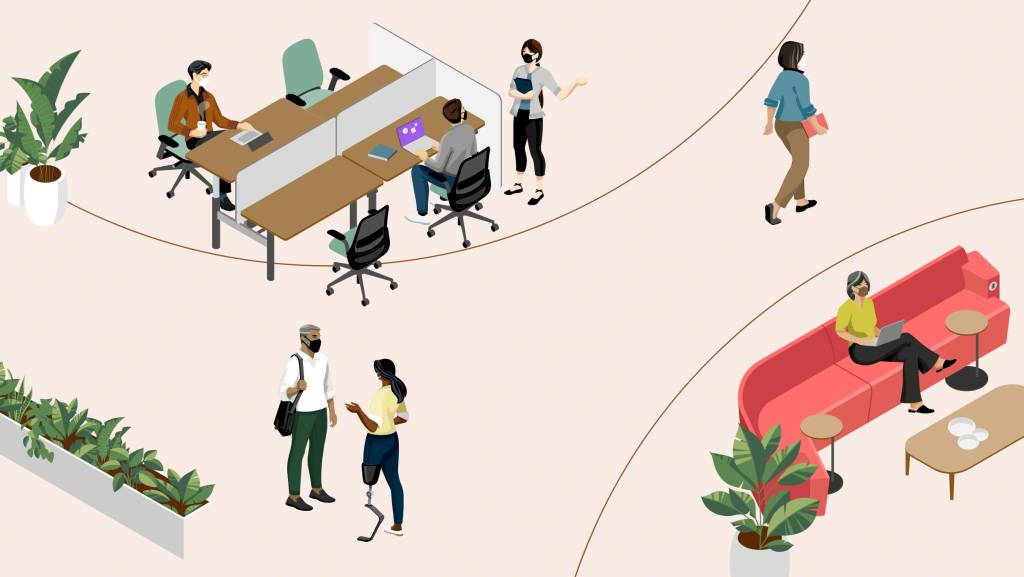
Top 5 Reasons People Want to Return to the Workplace
People ranked their top five reasons for wanting to return to the workplace out of multiple factors.
To view all country data use arrows below.
Productivity
People want to feel that what they do is meaningful, and this has been amplified during the crisis as organisations have needed to respond to dramatically changing business conditions.
Pre-pandemic, people struggled in offices if they didn’t have the right levels of privacy to allow them to do focused work. Now, there’s a lot of conjecture that people will come back to the office solely for group activities and collaboration. But the data show employees and leaders want workplaces to support individual focus work as well as collaboration.
“I don’t feel like we get into the insights we want working remotely. It’s very hard to communicate organically. If you’re physically in a room, you can write stuff down and read people’s body language better. I find we end up just skimming the surface (working from home).”
– Study Participant
Creative work, solving complex problems and innovation all require an ebb and flow between “me” and “we” work, which means the workplace has to provide spaces for both that make it easy to transition between the different work modes.
Employees, more so than leaders in many countries, express a need for the office to provide places to focus, potentially because their home environments are less likely to be the same size or have the same amenities, such as a desk, ergonomic chair and secondary monitor, as most executives have in their homes.

What People Want Most in Their Office Going Forward
People ranked the five most important elements the workplace should provide when they return.
Only France and Spain fail to list Focus in the top five. Researchers point to the fact that people in Spain felt more isolated than in any other country while working from home and that lockdown measures in France were extreme, causing both countries to consider connecting with others most important.
Five most important elements the workplace should provide when they return:
To view all country data use arrows below.
Comfort
People are more deeply aware of their physical, cognitive and emotional needs for comfort and wellbeing, and they expect organisations to address them when they return to the office.
Those who have been comfortable at home, whether it be because they enjoyed a more relaxed environment or had created a space to work that fits their preferences, want that to continue in the office.
Those who’ve been uncomfortable working from home are looking forward to an office designed holistically to support their comfort. They are now more acutely aware of their physical aches and pains after working from sofas, kitchen counters and even beds at home.
“Everything felt very temporary until it didn’t. My standing table, my foldable table, felt OK until it was a month and a half in and my back was killing me. My barstool felt OK until I realised I was hunched over all day and I needed a different solution.”
– Study Participant
Ergonomic discomfort was a top issue that people in most countries said hurt their ability to get work done at home. Cognitive and emotional issues like distractions, caring for others, and problems with technology and tools that made work more difficult were major concerns across many countries as well.
Cognitively, 9 of 10 countries rank a “quiet, professional environment” in their top five reasons for wanting to return to the workplace. Noise, visual distractions or even the lure of household chores are consistent challenges when working from home.
Emotionally, one of the most important things people want the organisation to provide when they return to the workplace is an increased sense of belonging to their team, a connection to the company culture and the ability to socialize. Germany, France, Spain and China all ranked socialization especially high, possibly due to rigorous restrictions around social gatherings throughout the pandemic.
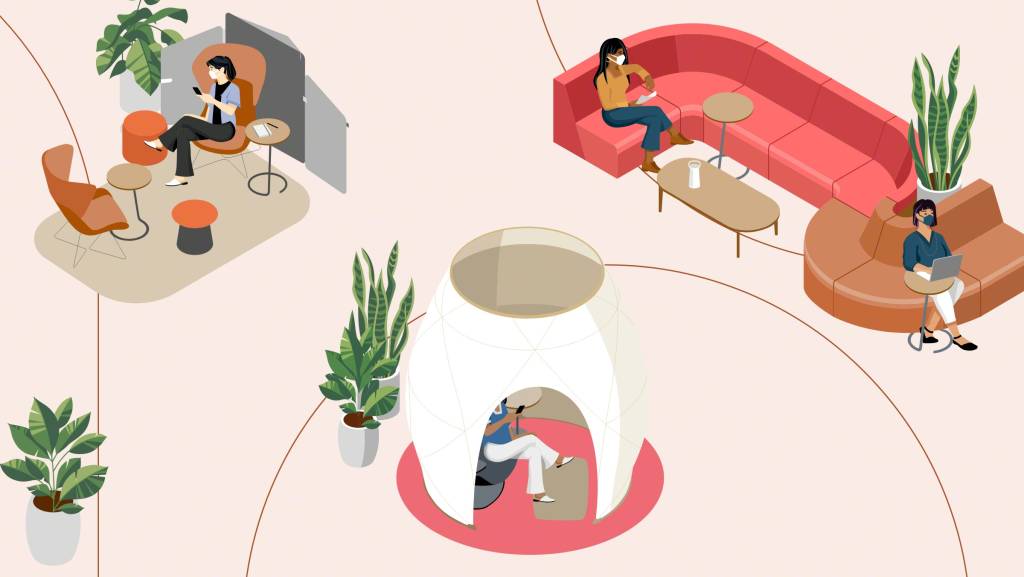
What Hurts Productivity at Home
People were asked to pick the top three things that negatively impacted their productivity while working from home.
To view all country data use arrows below.
Control
While being at home all day has its drawbacks, many people feel they have more control navigating their day at home than they do in the office. They are free to choose if they work from a dedicated office or sit on the sofa or outside, and they often have more choice to integrate aspects of their personal lives throughout their day, such as exercising or interacting with family, friends or pets.
In addition to no commute, another aspect of working from home that is highly rated by most participants is increased flexibility. They also feel their work-life balance and level of autonomy improves.
Moving forward, people will want the same level of control over their work lives that they have at home — control over where they work and their environment in the office.
Organisations are listening to employees’ increased desire to have more control over where they work. 87% of global leaders agree they will offer more choice and control for employees to work from home or elsewhere post-COVID. That’s an increase of 38% from April to September 2020, indicating leaders are paying more attention to what employees want.
“The thought of sitting in another beige cubicle staring at a grey wall is like a gut punch. When you do that for eight or nine hours a day, five days a week, it’s really dreary. I’d rather look out the window next to my nice big couch with a dog on my lap.”
– Study Participant
In addition to location, people in every country enjoy having access to a range of spaces at home (such as a couch, desk, table and the outdoors) and want diverse options in the office. This is especially true in China and Mexico, where employees particularly appear to value alternatives to working at a desk and chair all day long.
Other research conducted before the pandemic underscores that people want more control within their work area. Two-thirds of people with assigned workstations spend 70% of their time at their desk. They value a standing-height desk, but they want more ways to move and achieve a variety of postures.
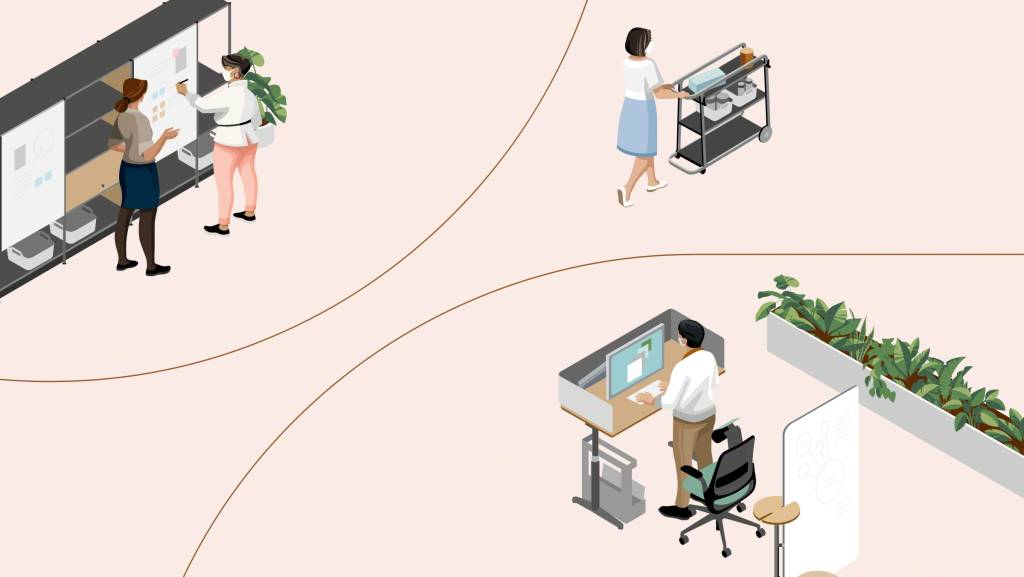
In another study, 54% of people said they want to be able to reconfigure their furniture, but only 38% can. This impacts people’s physical, cognitive and emotional comfort — neuroscience has found a well-established relationship between physical activity, creativity and learning.
The ability to move desks, technology or boundaries can help give people the visual and territorial privacy they need to focus. And with the pandemic in mind, people want to control their proximity to other people as well.
People Expect More Control After Working From Home
In every country people ranked autonomy and work-life balance as things that improved while working from home. Going forward, they will expect more control over where and how they work. Percentages indicate the number of people who said these factors moderately or significantly improved.
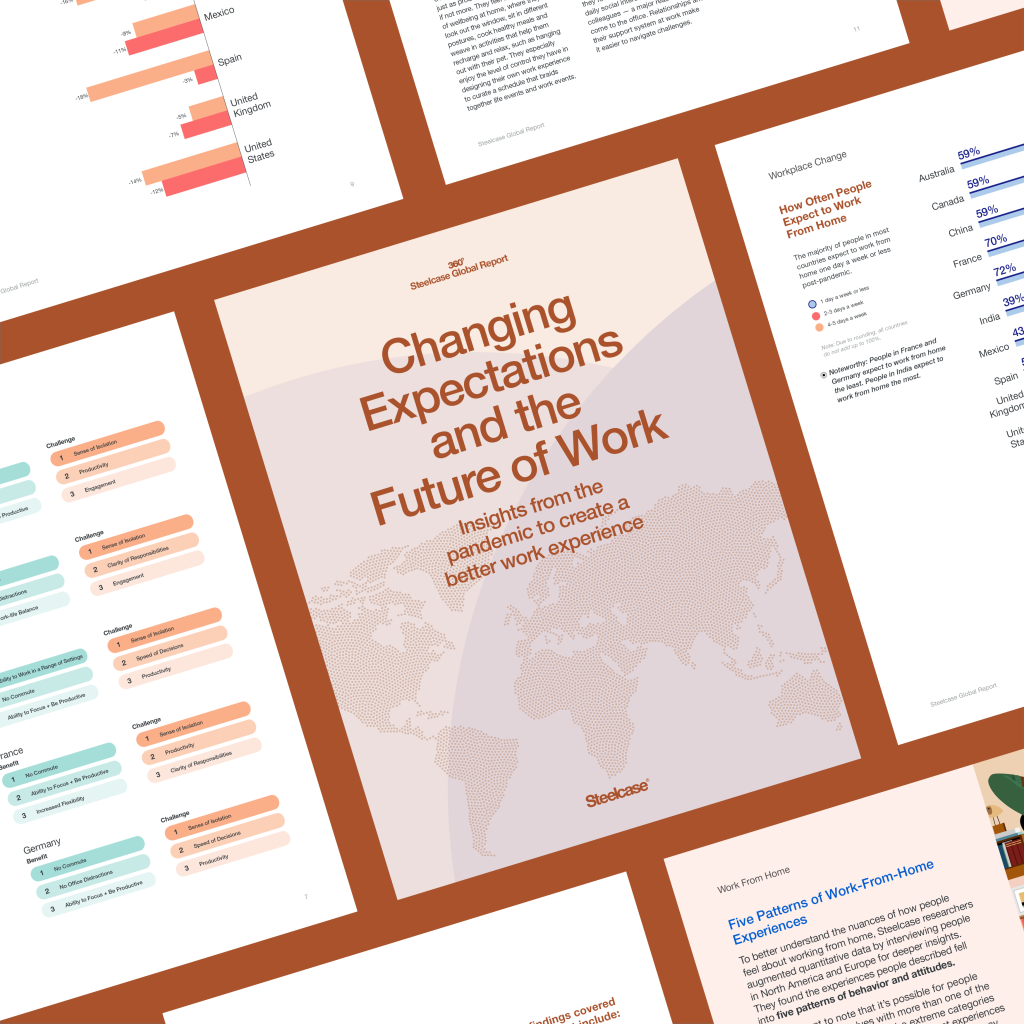
Download the full report
Register for a copy to read now or share with a colleague.
hbspt.forms.create({
portalId: “1822507”,
formId: “4e90005f-047e-4dce-b6c7-a60be515b8a2”
});


